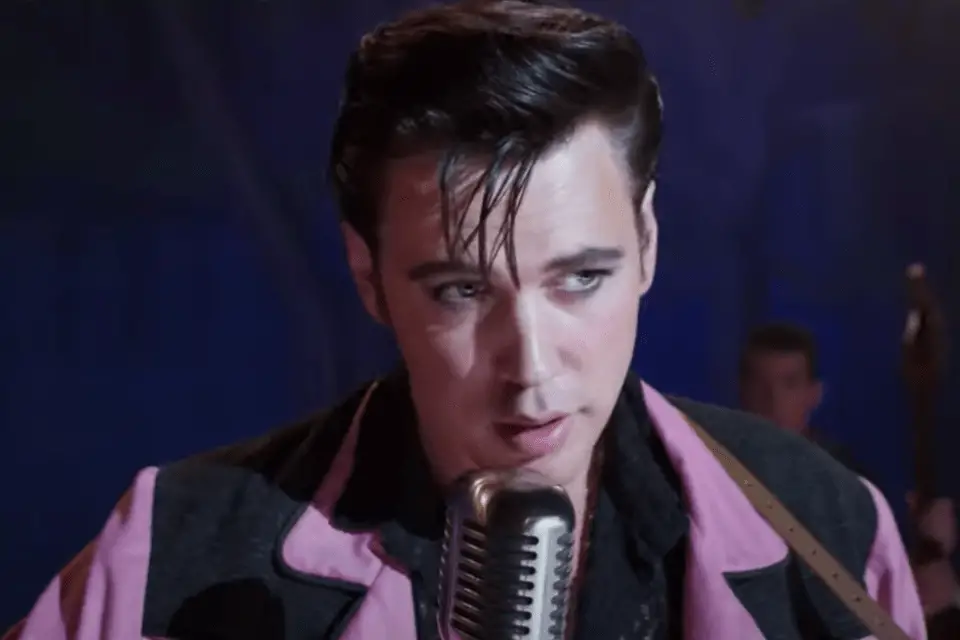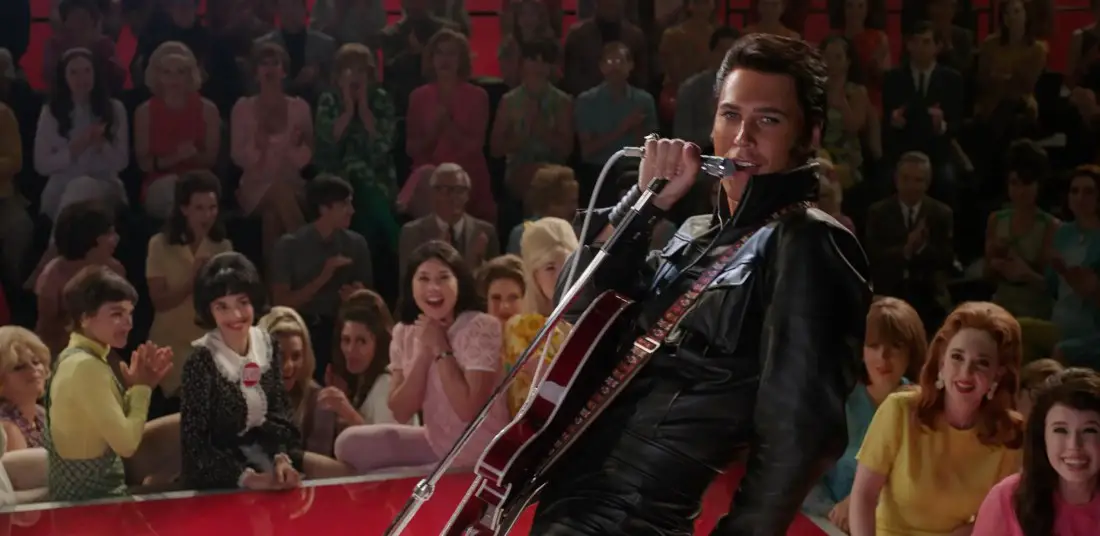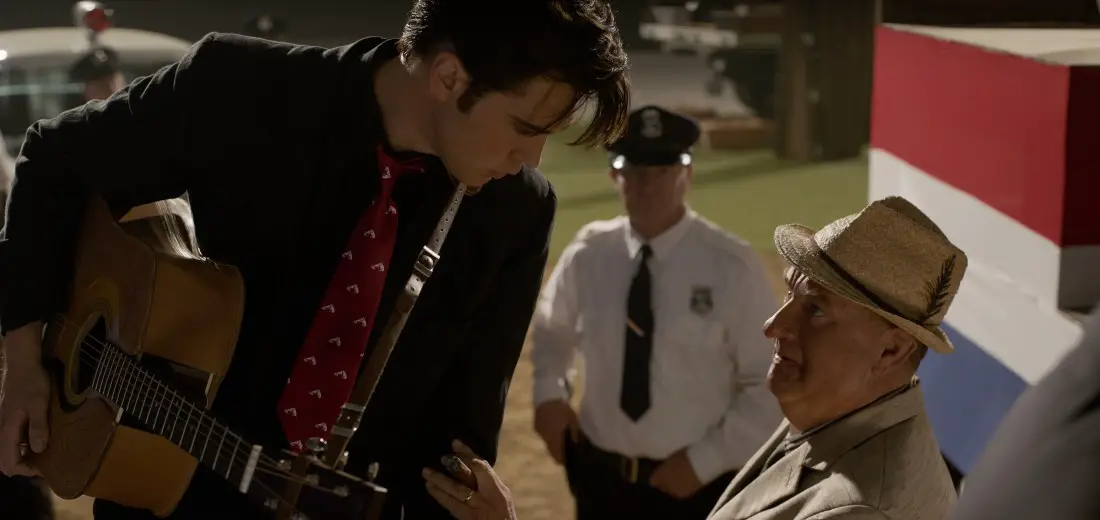‘Elvis’ Review: “Heart Heavy Laden, I Felt Fire Down In”

People know American singer (and occasional actor) Elvis Aaron Presley as the “King of Rock and Roll”. It’s one of those titles that causes a bit of discourse amongst music enthusiasts. Nevertheless, there’s no overstating his sheer impact on the music that forged today’s generation. His muscular, energetic voice made ladies’ heartbeats stop. Many admired his voice and his charisma on stage. His fame reached a point where people considered it a parody. It’s a sensation that only a handful of artists have experienced (The Beatles, Michael Jackson, to name a few).
And in some way, shape, or form, that’s how Australian filmmaker Baz Luhrmann arrives at the table, with his stylistic self and shimmering, glitzy, and rapid-fire directorial hand. This is all for better or worse. I say that because he’s “technically” the perfect person to direct an Elvis biopic. Who wouldn’t want to watch Luhrmann re-create the Aloha From Hawaii and Rapid City performances? The extravaganza comes from both ends, director and subject, which would tend to cause stylistically mesmerizing ripple effects.
At the same time, there is a probability that there would be a primordial focus on the style and flash of his career instead of having a balance between the highs and lows of his life. That is, of course, if we base it on the director’s previous outings, including Moulin Rouge (which I consider his best work) and adaptations of Romeo and Juliet and The Great Gatsby. Unfortunately, this Elvis biopic does not have much meat on its bones. Instead, it jams every critical “life-changing” moment of Elvis’ career forcefully onto an almost three-hour runtime. For those who have seen some of Luhrmann’s work, we know that ideas and concepts aren’t his forte.
READ: ‘Spiderhead’ Review: “How To Write A Meh Film”
Although we expect that there won’t be a thematic pull of significant proportions, at best, there would be an untraditional way to tell the story of a famed musician. We’d hope that the cliched structure of a biopic wouldn’t be followed. And Luhrmann, unfortunately, did as such. At points, Elvis nearly reaches Walk Hard: The Dewey Cox Story pastiche territory. The narrative has a freeform and loose sensibility that moves at a hundred-miler-per-hour speed, glimpsing through “key” moments of Elvis’ life in order to capture everything crucial to him. This causes a headache-inducing sensation because there is no clear purpose to the story being told.
When writing a biopic, the screenwriter must ensure that its titular subject is compelling and complex. Here, the opposite happens. Since it has a hundred-yard dash sensation as its storytelling device, in addition to having Tom Hanks (who delivers a surprisingly shoddy performance with a pretty awful accent) as Elvis’ manager, Colonel Tom Parker, it doesn’t highlight on not a single moment of his career. Instead, it scrolls through the ones everybody knows and doesn’t add a profound visualization of the rock n’ roll icon. Astonishingly, the film named after Mr. Presley revolves around his manager – the most uninteresting character in the picture. His performance feels like an SNL spoof skit forged it, thanks to his caked-up makeup. That’s unfortunate because you have Austin Butler, who delivers a revelatory performance that the entire world could hear.
Despite Butler not looking much like Elvis, he does the voices and mannerisms so exceptionally well that he completely sells the role. It’s similar to what Anthony Hopkins did in Nixon, which eventually earned him an Oscar nomination. On a more positive side, there’s originality in the visual craft. The pizzaz is genuinely in your face, and one can’t help but embrace it. An aspect that Luhrmann does exceptionally well is capturing the sensation that millions of people extremely loved Elvis. That brings some much-needed energy to a drab storytelling technique. One can’t deny that Luhrmann is a rare breed – getting total creative freedom to make blockbuster pictures. The facets surrounding the film (costume and production design, cinematography, lighting, among others) help elevate that sense of flash. And although it’s a problem that it focuses primarily on style, it’s glistening to look at.
Who deserves the props for this? Mainly Catherine Martin. The work she has made through her husband’s filmography is utterly remarkable. Elvis almost treats Elvis as a superhero. Luhrmann’s sight is with high praise and high praise alone. As mentioned earlier, it wouldn’t be dwelling on high concepts and ideas. Yet, one would like that this unique director took a different path to tell the story of the ‘Burning Love’ singer. There are glimpses of some of the bad things he did, but they are never expanded upon to a favorable and desired amount. Then there are modern and oldies music combinations, which take you out of the film’s ostentatious atmosphere.
When I finished it, I started to think that if I had been a bigger fan of his style, I would have probably enjoyed it more. And to be completely honest, I think that might be the case. Plenty of people have loved Luhrmann’s choices during the film’s runtime. Its style over substance in the manner of the over-the-top Australian filmmaker. However, all of this comes with the thematic sharpness of a butter knife. If you enjoy glitz and glamour, there’s plenty of that to appreciate. Albeit, I think it has too many narrative cliches and poor dialogue that diminish the scintillating style altogether. – Hector Gonzalez
Rating: 5/10
Elvis will release in theaters on June 24, 2022.






